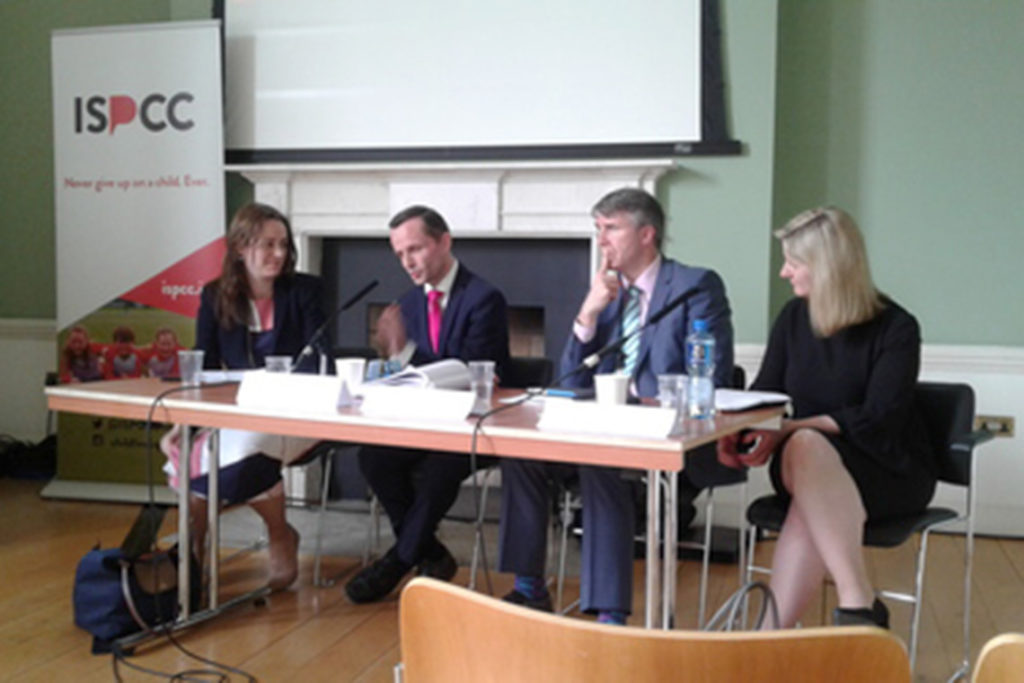
The critical need for a 24-hour social work service for children in Ireland was highlighted at an event hosted by the ISPCC to mark one year since the publication of a report on an audit by Special Rapporteur on Child Protection Dr. Geoffrey Shannon of the use by An Garda Siochana of emergency powers under section 12 of the Childcare Act.
The report, published on May 29th last year, clearly documented grave failings in Ireland’s child protection system, including a lack of adequate out-of-hours social work services, a lark of reliability of data captured on the Garda Pulse system in relation to instances of Section 12 removal of children and a lack of adequate training, resourcing or support for Gardai in exercising their statutory power to remove a child at risk of harm. The milestone report is believed to be the largest study of its kind ever conducted internationally into the use by a police force of emergency child protection powers.
Special Rapporteur on Child Protection Dr. Geoffrey Shannon, Ombudsman for Children Dr. Niall Muldoon and ISPCC CEO Grainia Long reflected upon progress made and actions still required since the publication of the milestone report at the event which took place at the Irish Architectural Archive, Dublin. Each highlighted the damaging implications of a system that does not fully resource a 24-hour social work service and spoke of the need for an all-of-government approach to ensure this objective can be met and that children who have been failed by their parents are no longer failed, for a second time, by the State.
Dr. Shannon and Dr. Muldoon both emphasised the need for a social work service to be made available 24 / 7, 365 days a year, as well as the need for child protection agencies to be co-located to ensure that children receive the best possible standard of support. The Children’s Ombudsman outlined how exploratory visits had been undertaken to Belfast, Oxford and the Bronx, New York, to view best practice child protection models in operation in those cities, with a view towards developing co-location child protection services in Ireland. Outlining how co-location would increase efficiencies and deepen the understanding of professionals of the work of their counterparts in other agencies, he said: “from there we can start to change the type of republic we have for children and young people. We’ve got to do better with our services. We owe it to children and young people not to fail them a second time.”
Outlining gaps in child protection systems as identified by the audit, Dr. Geoffrey Shannon described how he found the Garda Pulse system was not able to provide a clear and concise picture of section 12 removals and a deep-seated culture of learning on-the-job prevailed. Comprehensive child protection training, Dr. Shannon said, needs to be provided to members of An Garda Siochana as an urgent matter and needs to be renewed on a regular basis. Dr. Shannon proprosed issuing a pocket-sized booklet to all members of An Garda Siochana with guidance on the most appropriate action to take in situations where they may be required to use their powers under section 12 of the Childcare Act.
The passing into law of the Public Health Alcohol Bill was another measure which Dr. Geoffrey Shannon outlined needed to be taken in order to help avoid drug and alcohol abuse by parents having a very damaging effect on children. Dr. Shannon recounted a case from his audit in which a highly intoxicated woman was found slapping and dragging a child, as an example of how such abuse can have far-reaching consequences for children and young people. In his 2017 report, Dr. Shannon had stated ‘the failure by society to address alcohol as a fundamental problem places insurmountable burdens on the child protection system’.
ISPCC CEO Grainia Long thanked Dr. Shannon for producing a report which, she said, contained stories which we thought we wouldn’t see in Ireland any more. The report, she outlined, highlighted the uncomfortable reality that many children in Ireland are not safe in their own homes. Ms. Long said: “we know only too well the implications of a system that does not fully resource a comprehensive, dedicated, 24-hour social work service. The vast majority of calls to Childline take place outside office hours, echoing the findings of Dr. Shannon’s report. Children tell us that they are told by social workers to call Childline if they are in need of support out-of-hours. A 24-hour social work service should be there to provide the support they require.
“We need to stop wringing our heads when reports are published and we need to say ‘what do we do now’? Success looks like implementation now, not in the future. Everything we are talking about here today is simply about recognising the rights that children have. It is imperative that ever agency understands these rights so that children can be protected in the most comprehensive way possible.”
